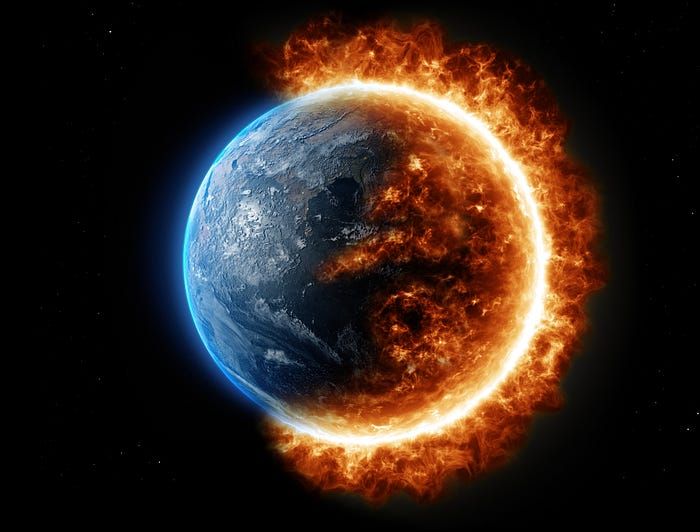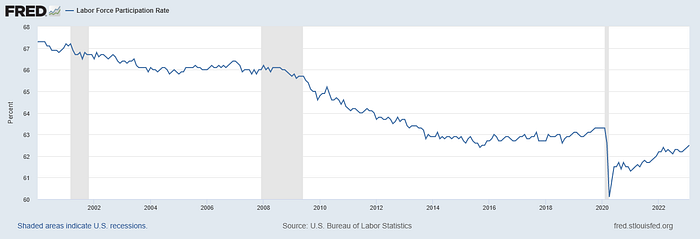How Younger Generations Might Inadvertently Destroy Civilization

We didn’t need Greta Thunberg shaking her tiny fist at the United Nations to believe Boomers epitomize selfish consumption at the cost of the entire planet.
Greta just put an angry face to what many felt.
The thing is, even the most hysterical climate alarmists don’t say we’ll be dead in ten years.
- True, they recently said if we don’t reduce carbon emissions to caveman-like levels soon, the sun will slowly cook us to death.
- But the damage will play out by the end of the century, not in our lifetimes.
We’re so focused on long-tail climate risk that we may be missing a much greater risk right under our noses. What’s that, you ask?
It’s the ever-declining percentage of people working and paying taxes.
Who Needs the Stress of Work?
You can say this about the Boomers. On the way to indulging their epic selfishness, they also presided over an unprecedented boom in the global economy. Sure, they got rich along the way, but so did Western society.
Living standards have never been higher for more people than right now.
Where just a hundred years ago, most people still spent most of their time in providing for their basic subsistence, almost no one does so today in the West.
We should acknowledge many people still work full-time minimum-wage jobs, which we can consider the modern equivalent of subsistence farming.
But where Generations Y and Z have a choice, they are choosing differently than the Boomers and Generation X in important ways:
- They consider their health and well-being more important than any mere job;
- They don’t expect to have a career with, or to see loyalty from, any one employer;
- They don’t believe in the traditional workplace bargain, where the employee works for 45 years and retires at 65 with a pension to enjoy 15 years’ retirement.
The time to travel the world and experience life is when you’re young! Your 20s and 30s are the peak times. Work, family, relationships — all that can wait. Especially while you can draw upon the bank of Mom and Dad.
Millennials (Generation Y) and Generation Z are not wrong. They’re simply making life choices that reflect their values and interests.
But their choices are also affecting society in one particular respect. If you’ve been outside in any metropolitan area recently, you might have noticed it: a great many working-age people are, well, not working.
How Many People Are Actually Working?
The working-age population is defined as people between the ages of 15 and 64. This was 207 million people in the U.S. at the end of 2022, out of a total population of 334 million.
The labor force participation rate is the percent of the working-age population that is actually working. That number has been steadily declining for over 20 years, from over 67% in 2020 to not quite 63% now. In numbers, that’s about 130 million workers.

Sounds like a lot, right? Not so fast. Average hours worked per week are about 35, or 87.5% of a 40-hour week. That reduces our full-time equivalent to just 114 million workers.
And of those hours spent “at work,” how many do we believe are actually productive? You might remember the joke about the reporter asking “How many employees work here?” and the CEO answering “Oh, I’d say about half of them.”
I’m not quite so pessimistic but seeing in practice how people juggle private lives with work, take time off for medical appointments or family issues, and just plain waste time at work, I think assuming 60% productivity is generous.
That brings us to 68 million full-time equivalents, representing just 20% of the total population. Effectively, one in five people is carrying a heavy load for the rest of us.
It’s Not Just Generation Y and Z Who Are Opting Out of Work
The declining number of people actually doing productive work is scary enough. Let me alarm you further by explaining how few individuals pay the majority of taxes.
According to the Internal Revenue Service, in 2020 just 1.6 million individuals (the top 1% of taxpayers) paid more than 42% of all income taxes.
- The top 5% of taxpayers (8 million tax returns, a bit over 2% of the population) paid almost two-thirds of all income taxes.
- The bottom 50% of taxpayers (79 million tax returns) accounted for just 2% of income taxes.
The takeaway is that a small number of wealthy earners (just one in fifty people) pay the large majority of all income taxes, and half of the workers pay very little.
Who makes their way into the ranks of the top 5% paying for the majority of the government’s revenue? Although there are examples of young company founders who do so, by far the typical representative is a member of Generation X or a Boomer who is capitalizing on decades of climbing the career ladder.
Here’s the thing. You probably know the Boomers have been retiring in grand fashion. Some two million a year have been leaving the workforce for a decade. About 40% are already retired. Although this means the majority are still working, they are retiring soon.
What happens when these high earners have left the workforce?
What Is the Consequence of Fewer Workers?
Successive generations typically take up the mantle laid down by those retiring. Generation X is far too small to pick up the burden (as are their kids, Generation Z).
The children of Boomers, i.e. the Millennials, would be a large enough group to fill the gap. But as noted above, they’re not interested in the same work stress that Boomers embraced.
Even worse, at least some Millennials are embarrassed by the wealth their parents amassed, so have already begun giving it away.
It’s wonderful what an enlightened generation can do, right? Well, the unfortunate downside of this philanthropy is an even faster decline in income tax revenue.
The simple reason is that charitable donations reduce one’s taxable income. Thus, the already lower income Millennials earn is reduced further by their giving away a portion of their parents’ wealth.
When the U.S. is committing itself to grandiose spending plans (including the Social Security and Medicare payments for all those retiring Boomers), we can thus predict a steadily shrinking tax base.
The consequences of Millennials working and earning less than their parents will be rapidly increasing debt and inevitable fights over competing priorities.
- The Boomers have too much political power to see their benefits reduced.
- This means everything else eventually will be cut: the military, infrastructure, and schooling.
The Future is Bright … Because We’ll Be Burning
I can’t say whether intergenerational strife will escalate to outright hostility or whether we can anticipate merely that our living standards will decline.
I do expect that younger generations will be even angrier than they are today when they realize their living standards are on a constant downward trajectory with no prospect of reversing course.
The world may not be in danger of burning up because of global warming anytime soon. But I fear fires in our future nonetheless, and perhaps sooner than anyone imagines.
Be well.
Hit reply to tell me what's on your mind or write a comment directly on Klugne. If you received this mail from a friend and would like to subscribe to my free weekly newsletter, click here.
A version of this story was originally published on Medium in Unpopular Opinions.






Member discussion